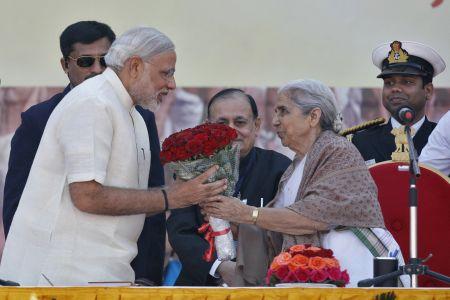 In the continuing tug of war between Narendra Modi government and the governor, the state assembly on Tuesday passed the Gujarat Lokayukta Ayog Bill 2013 for a second time without incorporating any major changes sought by Raj Bhavan, setting the stage for a fresh confrontation.
In the continuing tug of war between Narendra Modi government and the governor, the state assembly on Tuesday passed the Gujarat Lokayukta Ayog Bill 2013 for a second time without incorporating any major changes sought by Raj Bhavan, setting the stage for a fresh confrontation.
Governor Kamla Beniwal had on September 3 returned the bill, passed by the assembly on April 2, to the government for reconsideration, dubbing the legislation as "complete mockery of the judicial process and detrimental to the interests of public welfare".
The contentious new bill seeks to establish the primacy of the chief minister and the government in the appointment of anti-corruption watchdog.
The bill, piloted by Finance Minister Nitin Patel, was passed by the House amid protest by the lone Opposition MLA present -- Keshubhai Patel of Gujarat Parivartan Party – who demanded it be sent to the Standing Committee. The MLAs of main opposition Congress and Nationalist Congress Party were on Monday suspended for two days for creating unruly scenes.
In the existing Gujarat Lokayukta Act 1986, the power of selection of Lokayukta is vested in the governor and the chief justice of the high court. The new bill provides for appointment of the lokayukta by a six-member committee headed the chief minister.
The bill passed on Tuesday incorporated two minor changes from its earlier version including one pertaining to the definition of the governor. The other was deleting words 'substantive capacity' from section 3 sub section five of the bill.
The sub-section five of section 3 of the previous bill said, "The Lokayukta shall be a person who is or has been a judge of Supreme Court of India or Chief Justice of a High Court in a substantive capacity".
The Modi government and Governor Beniwal have been at loggerheads on the issue of appointment of Lokayukta ever since she appointed Justice (Retd) R A Mehta to the post on August 25, 2011 bypassing the government, triggering a prolonged legal battle.
Though her decision was upheld by the high court and Supreme Court, the post is still lying vacant in the state as Mehta refused to take charge.
The bill provides for a six-member selection panel under the chief minister. Speaker of the state assembly, a minister nominated by the CM, leader of opposition, a high court judge appointed by the chief justice and chief vigilance commissioner of the state will be other members of the committee.
In her note to the government while returning the bill for reconsideration, Governor Beniwal had expressed serious reservations about the composition of the selection panel.
"The above provisions regarding the constitution of the Selection Committee show that out of six members, four will be definitely and undoubtedly belonging to one political party--the CM, speaker, minister appointed by CM, and vigilance commissioner.
"The very constitution of the Selection Committee suggests that leader of opposition and judge would be in minority and their voice would have hardly any significance, because their objections could be easily overruled," she had said.
"The above provision for the appointment of the kayaked cannot stand the scrutiny of any rationality and is in clear violation of the mandate which has been reflected from several decisions of the Supreme Court from time to time," she said.
The governor, listing the faults in the bill, had said that the legislation had the provision that the Kayaked shall not investigate any complaints which is excluded from its jurisdiction by virtue of a notification issued by the state government.
"This provision takes away the entire jurisdiction of the Kayaked Agog to investigate into any complaint by the virtue of notification. Thus the ultimate powers of getting any allegations investigated by corruption watchdog are kept with the state government only," she said.
The governor was also critical of punitive action that is proposed in the bill of jail for six months or fine of Rs 25,000 for malicious complaints.
"The above provision discourages and threatens the complainant from filing any complaint," she said.
She also disapproved of the provision that made it mandatory for the complainant to have personal knowledge of allegations that he was making against the public functionary.
"Complainant can derive information from anywhere like from government departments or offices or by using Right to Information Act 2005 or that from newspaper reports. It is difficult for any applicant to prove that he has a personal knowledge about the information of irregularity being committed by the public functionary or a minister. The very provision restricts the scope of such complaints that the Kayaked Agog will have to investigate," she said.
She had also ticked off the state establishment for their attempt to define Governor in the bill.
"In clause 2 (5) of the bill `Governor' is defined. This is irrational and is not expected from the legislature. Governor is a constitutional authority whose role, responsibilities, qualifications of appointment, functions, powers, have been well defined in the Indian constitution. Such a mention in the bill is an attempt to belittle the dignity of the highest Constitutional office of the state," she said in the note.
Image: Gujarat Chief Minister Narendra Modi with Governor Kamla Beniwal at a function in Ahmedabad
Photograph: Amit Dave/Reuters









